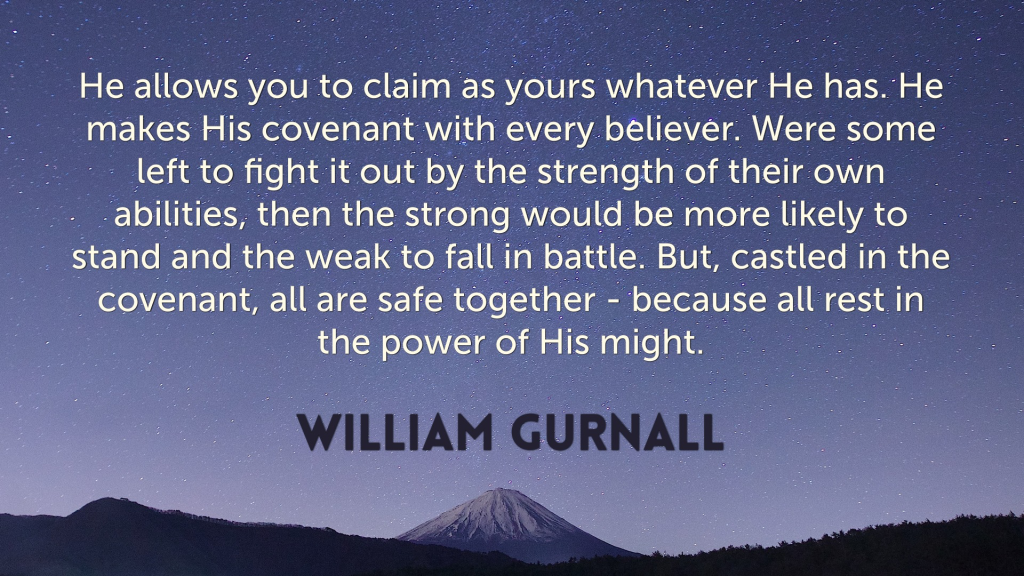Doubt and fear are two responses to situations in life that are common to all of us. One could say that they’re woven into our spiritual DNA as fallen creatures this side of the curse. Maybe you fear and doubt that the Lord will provide for your family, so you overwork yourself to the point of exhaustion. Maybe you doubt the Lord’s goodness to you in the gift of your spouse, so you are constantly seeking to control your marriage. Perhaps struggles with infertility for years have become such a burden that you doubt if God even hears your cries at night. Or possibly you’re experiencing something that we’ve all experienced at some point in our Christian walk – doubt that we have even truly been saved by God.
Can you relate to experiences like these? If you can, then you know that fear and doubt has the capacity to absolutely paralyze us. Rather than living a life confidently in the graces of God, we respond with a life of both apathy and control. Our doubts and fears lead us toward bitterness and resentment, both toward God and other Christians. When life seems to be going so well for everyone else, what can we do when God feels distant and we doubt his promises to us?
Abraham knew what it was like to experience doubt and despair. Both he and his wife Sarah were quite old in age, and had yet to produce any offspring. The author of Hebrews describes Abraham as someone who was as “good as dead (Hebrews 11:12),” both because of his old age but also because infertility was equivalent with death in ancient near eastern culture and society.
But then in Genesis 15 the Lord came and spoke to Abraham, and everything changed – or so we would think. Here is Abraham before the face of the Lord of the universe, and he still doubts the promises of God; not once, not twice – but three times! The first example of this is when God promises Abraham a “great reward.” How does Abraham respond? He casts blame on the Lord that he continues childless and that one of his servants will become his heir (Gen. 15:2). Rather than believing the promise of God, he blames him for his current circumstances. I’m sure you can relate.
But this isn’t the end of Abraham’s struggles with fear and doubt. Once again the Lord makes a promise, this time promising Abraham land for his offspring, but he doubts once again. “How can I know that I will possess it?” he asks (15:8). Are you sensing a pattern here? This time, Abraham asks for proof and evidence to back up the Lord’s promises. And God does just that.
In one of the most remarkable and extraordinary demonstrations of God’s love in all of Scripture, despite Abraham’s doubt God enters into covenant with him (15:12-21). In other words, God makes an unbreakable, intimate, loving promise bound in blood that he will remain true to his word with Abraham.
After this whole ordeal, Abraham’s struggles with fear and doubt are over – right? Wrong. As a perfect example of how we all react to our fears and doubts, Abraham and Sarah try to control their situation rather than trusting the covenant promises of God. They take the promise of offspring into their own hands, and Abraham has a child by Sarah’s servant Haggar (Genesis 16). What began as a seed of doubt fully blossomed into a full-grown tree of disobedience.
At this point, how would you respond to someone like Abraham? If I made a promise to someone twice, with a huge demonstration of my love and loyalty to them, and they still blew me off – I’d be pretty frustrated! But frustration has no place in the covenant love of God. Rather than pouring out justifiable anger on Abraham the Lord renews his covenant with Abraham (Genesis 17), promising that he will be the God of Abraham and his children forever (17:8).
So what does this have to do with us? Well, consider this: Genesis 15-17 are foundational narratives for the rest of redemption history. Abraham is the great patriarch of not only the people of Israel, but of the gentiles also (Romans 4:11-12). He is the great example of faith and works that both Paul (Romans 4:3, Galatians 3:6) and James (James 2:21) refer to. How comforting it is for us to see then that this great example of faith was just as fallen as we are! Even though he was in the presence of God, experiencing the Lord’s covenant love, he was still stricken with doubt and fear that God’s word would be true for him.
What can we take away from all of this? Doubt and fear are things we will all struggle with in the Christian walk. Yet, when we are overcome with doubt and despair, we remember that God has made covenant with us in Christ (Hebrews 9:15). As the Psalmist constantly tells us, God’s covenant love – also known as his steadfast love – endures forever (Psalm 100, 107, 107, 118, etc.). The puritan William Gurnall described God’s covenant love in this way:
God’s covenant engages His almighty power. He puts His own hand and seal to His promise, and like the mountains surrounding Jerusalem it stands, never to be removed. As His name is, so is His nature – a God who keeps covenant forever. He does not parcel Himself out, a few crumbs to one, a crust to another – as one feeds the sparrows. He allows you to claim as yours whatever He has. He makes His covenant with every believer. Were some left to fight it out by the strength of their own abilities, then the strong would be more likely to stand and the weak to fall in battle. But, castled in the covenant, all are safe together – because all rest in the power of His might.
So when we are overcome with doubt and fear, we take heart in the fact that the strength of our faith never comes from within ourselves, but it comes from the object of our faith: the one who has given us his Son as the utmost expression of this covenant love. I think this is why Christ was able to say that faith the size of a mustard seed can move mountains (Matthew 17:20), because the power of our faith always comes from him. Even the smallest faith is saturated with the covenant love of the Almighty.
Friend, where are you doubting God’s covenant love in your life? How could trust in his promises allow you to relinquish control and give you confidence to live under His loving Lordship? Why not allow today to be the day where your fears and doubts fade, and are instead replaced by confidence in God’s steadfast love?
For the Lord is good;
his steadfast love endures forever,
and his faithfulness to all generations. – Psalm 100:5




